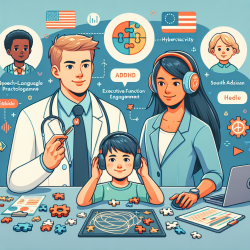Introduction
In the ever-evolving field of speech-language pathology, staying informed about the latest research is crucial for practitioners aiming to enhance their skills and improve outcomes for children. A recent bibliometric study, "Trends in Scientific Literature on Atypical Antipsychotics in South Korea," provides valuable insights that can be applied to our practice. This study, conducted by López-Muñoz et al., explores the growth and trends in scientific literature on second-generation antipsychotic drugs (SGAs) in South Korea. While the primary focus is on psychiatry, the methodologies and findings can be leveraged to refine our approaches in speech-language pathology.
Data-Driven Insights
The study utilized bibliometric indicators to analyze the exponential growth of scientific publications on SGAs in South Korea from 1993 to 2011. This growth aligns with Price's law, indicating a robust increase in research activity without reaching saturation. For speech-language pathologists, this underscores the importance of continuous research and adaptation to new findings. By applying similar bibliometric methods, practitioners can track advancements in therapeutic techniques, speech disorders, and intervention strategies.
Encouraging Further Research
One of the key takeaways from the study is the emphasis on collaboration and knowledge dissemination. The research highlights how South Korea has become a significant contributor to global SGA literature, with a notable participation index. Speech-language pathologists can draw inspiration from this by fostering collaborative research efforts and contributing to the global body of knowledge. Engaging in interdisciplinary studies and publishing findings can elevate the field and improve therapeutic outcomes for children.
Practical Applications
Implementing the outcomes of this bibliometric study can lead to several practical applications in speech-language pathology:
- Evidence-Based Practice: Utilize bibliometric tools to assess the impact of various therapeutic approaches and tailor interventions based on the most effective strategies.
- Interdisciplinary Collaboration: Collaborate with researchers in psychiatry and other fields to explore the intersection of speech disorders and mental health, leading to comprehensive treatment plans.
- Continuous Education: Stay updated with the latest research trends and findings to refine skills and enhance the quality of care provided to children.
Conclusion
The bibliometric study on SGAs in South Korea serves as a reminder of the power of research in driving advancements in any field. For speech-language pathologists, embracing data-driven decisions and fostering a culture of continuous learning and collaboration can lead to transformative outcomes for children. By applying the insights from this study, practitioners can unlock new potential and contribute to the betterment of the field.
To read the original research paper, please follow this link: Trends in Scientific Literature on Atypical Antipsychotics in South Korea: A Bibliometric Study.










